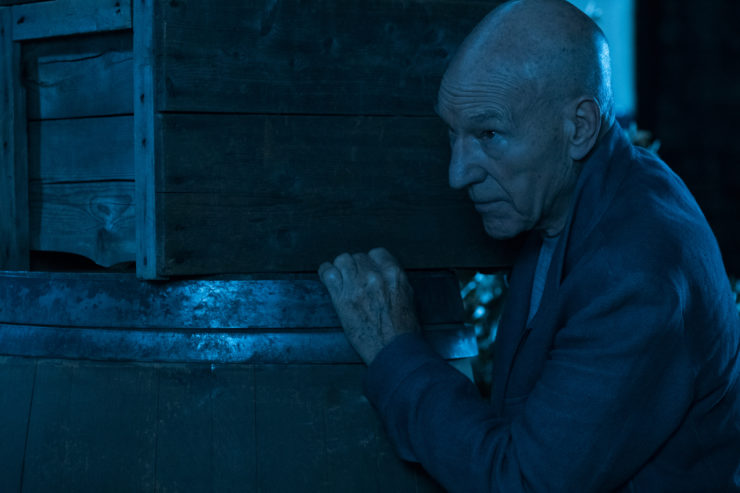We finally get the end of the story that was started in “Monsters” when Tallinn ENTERED PICARD’S BRAIN! Indeed, we get more revelations and things happening in this, the nineteenth overall episode of Star Trek: Picard than in the previous eighteen combined. The biggest is what we learn about Jean-Luc Picard, but there’s also some other big deals—and all without Q even showing up.
Let’s start with the biggest revelation: Yvette Picard committed suicide when her younger son was a little boy. Specifically, she did so in the solarium, and only was in there because little Jean-Luc let her out of her bedroom after her husband Maurice Picard had locked her in that room for her own safety.
From a character point of view, this brings a lot of who Jean-Luc Picard is into focus. Why he had such a contentious relationship with his father, why he was so eager to go into space and avoid the family business, and why his relationship history is checkered to say the least. Sir Patrick Stewart also beautifully plays the elderly Picard finally dragging these memories out of the darkness, and I’m so glad they had Tallinn hug him, because that performance called for a big hug, and Tallinn fills in for the audience there.
Kudos to James Callis, Madeline Wise, and Dylan Von Halle for how they play the Picard family in the flashbacks. All three do superlative work, from Callis’ concerned crankiness as Maurice to Von Halle’s blithe innocence as little Jean-Luc to Wise’s tragic fragility as Yvette. But they also feel like a real family, with the banter and conversations and such. (It helps that the dialogue all rings quite true; the script is credited to executive story editor Matt Okumura and staff writer Chris Derrick.)
Unfortunately, from a Star Trek point of view, from a worldbuilding point of view, this entire storyline is just complete and utter nonsense.
These flashbacks take place in the early days of the twenty-fourth century, some fifty years or so after the original series episodes “Dagger of the Mind” and “Whom Gods Destroy” made it clear that the Federation had done tremendous work in eliminating most forms of mental illness. Now, it has been stated that Yvette refused to get help for what appears to be either schizophrenia or clinical depression (or both), and that’s in keeping with the anti-technology bent of the Picard family as seen in TNG’s “Family,” but still, it strains belief that if she was suicidal that she got no help.
And just in general, this whole thing feels like it’s out of a nineteenth-century drawing-room drama instead of three hundred years in the future: Yvette hanging herself with a rope while wearing a white dress in a solarium, after her son lets her out of the bedroom with a skeleton key, where she’d been locked away, because of course that’s what you do with a woman who’s hysterical. The scenario feels dated now, much less for the era being portrayed.

On top of that, Picard’s had his mind ripped open any number of times, most notably when he was assimilated by the Borg, when he was tortured by Gul Madred, and when he mind-melded with Sarek. Plus, he’s been through tons of therapy and trauma, and this never came out before now? For most characters, I’d accept it, but given what all else Jean-Luc Picard has been through, it strains credulity a bit.
Plus, there’s a major missing element to all these flashbacks: Yvette and Maurice’s older son Robert, also introduced in “Family.” It’s such a blown opportunity, too, as the dichotomy is there for the asking. In “Family,” Robert was very much taking after their father: disdaining technology, taking over the winery from the old man. This entire season of Picard has been dedicated to showing that Jean-Luc was very much his mother’s son—she was the star gazer, she was the one who encouraged his love of space. Here was a wonderful opportunity to show the origin of the sibling dynamic we saw in “Family.”
(One discontinuity is spackled over, at least: Picard mentions that he often imagined his mother as an old woman offering him tea, which explains the one sighting we’d had of Picard’s maman prior to “The Star Gazer,” to wit, the illusion of her, played by Herta Ware in TNG’s “Where No One Has Gone Before.” Picard’s sad “no” in response to Riker’s query if there’s anything he can do has a lot more pathos in light of the revelations of this episode…)
All this happens in the middle of an action movie, because of course it does. The Borg Queen is taking over Jurati’s body, and is trying to take over La Sirena, aided by Soong and the mercenaries he hired, who have all been sorta-kinda assimilated.
I say sorta-kinda because after that nasty-ass cliffhanger last week, after Seven saying these mercenaries aren’t human anymore, they’re Borg, what we see are—um, a bunch of mercenaries shooting guns. There’s absolutely nothing Borg about them except that they’re working for the new Borg Queen, but given Soong’s monetary resources, they’re probably being paid enough that that wasn’t even necessary. And being Borg drones doesn’t give them a single solitary advantage, especially since Seven, Musiker, Tallinn, Picard, and the Emergency Combat Hologram all are able to take care of them without too terribly much effort.
Buy the Book


The City Inside
Yes, there’s an Emergency Combat Hologram! And it’s patterned after Elnor, so we can get Evan Evagora back! And it’s programmed with Elnor’s memories up to the moment he died, er, somehow, so he and Musiker can Have A Moment. Sigh.
Mind you, this makes sense in general. Holograms can’t be physically harmed, so they’re a great resource to have in a fight. I mean, the mercs’ bullets wouldn’t have any effect on him, and indeed the ECH is only stopped when the Jurati Queen in essence turns him off.
Jurati fighting against the Queen for control of their now-shared brain meats is a running theme throughout the episode, with Jurati keeping the Queen from taking over La Sirena by using a complex lockout code, and creating the ECH, and also storing the code to the hologram, Jurati herself not having memorized it.
The Queen is able to reassert dominance for a time, long enough to erase the ECH and mortally wound Seven, but then Jurati reasserts herself.
Probably the biggest recurring theme this season has been characters making a speech that changes someone’s life and outlook—and those speeches also not convincing me in the slightest. First we had Picard unconvincingly getting Renee not to back out of the Europa mission. Then we had Picard even less convincingly getting Agent Wells to stop being suspicious of aliens invading Earth by telling him that the aliens he encountered as a youth tried to erase his memories without his consent. And now we have Jurati convincing the Borg Queen to be a kinder, gentler assimilator, to only absorb cultures that need help. To be a true collective, one that is cooperative.
One that might even go through a rift in space and ask to join the Federation…
Mind you, I love this result. It’s a very Star Trek solution to the Borg, one that opens up all kinds of possibilities. But I just didn’t entirely buy how we got there.
At this point, the timelines are completely muddled. The episode ends with the Queen taking La Sirena off into space to be this spiffy new Collective, and wasn’t the whole point of this exercise to not change history? I have no idea. There’s only one episode left, and our heroes’ only method of getting back to the twenty-fifth century just buggered off into space to completely change what the Borg are. (And how’s she supposed to do that, anyhow, especially with the Borg themselves actually around in this century. What happens when the Jurati Queen interacts with this timeframe’s Queen?)
However, even with the Queen gone, we still have a bad guy to deal with. Soong is still determined to stop the Europa mission, since he has been told by the Queen that his future legacy depends on it.
Which is too bad, because while it was fun to watch Brent Spiner as the egomaniacal mad scientist, he’s now morphed into a Bond villain, and that’s way less interesting. His verbal confrontations with Picard are pretty nowhere, and his escape at the end is less than convincing. The finale is being set up to be a confrontation against Soong, though there’s also Q—who doesn’t even appear in this episode—to deal with, and I have no idea how they’re going to do this. I mean, the obvious answer is Q, but he’s depowered…
There are two other plots in this episode, one kinda meh, the other fabulous. The former is the continued Rios-Ramirez relationship which is perfectly fine, but not very gripping. I adore Sol Rodriguez’s Teresa Ramirez, mind you, and she and Santiago Cabrera have superb chemistry, but the storyline isn’t really doing anything for me.
However, we also get some great stuff with Seven. We start with her finally telling us why Seven didn’t join Starfleet after Voyager got home in “Endgame“: they wouldn’t let her. According to Seven, Janeway went to bat for her and threatened to resign, but Starfleet refused to allow her into the club. They did allow Icheb, as we saw in “Stardust City Rag” last season, but Icheb was barely even a Borg, really—he’d only just been assimilated and was just out of the incubator when Voyager found him in “Collective.” Seven, by comparison, had been a Borg for twenty-four years, assimilated at the age of six.
This is prompted by Musiker telling her that she’d make a great starship captain. After hearing her tale of woe, Musiker starts to say that when they get out of this, but Seven cuts her off, saying they won’t get out of this, as Seven is unaware that she’s an opening-credits regular in a TV show and therefore almost definitely will get out of this. But at this point, Seven’s been human for about as long as she was a Borg. Would Starfleet be just as cranky about letting her in, especially given how much more they know about the Borg now?
That’s a question for next week—or next season. Or perhaps for the Seven/Fenris Rangers spinoff that people have been clamoring for pretty much since she appeared at the end of “Absolute Candor.” For now, though, we do get one more important scene both with and about Seven, because the biggest part of Jurati’s argument to the Queen—and pretty much the only convincing part—is the example of Seven. She’s spent the last twenty-three years combining the best of her Borg background and her humanity, and what Jurati poses to the Queen is to make up an entire collective of Sevens. Which is a nice thought.
When the Queen is convinced to be not such a horrible person, the first thing she does is heal Seven from the wound she herself inflicted, but in order to do so, she has to restore Seven’s exact Borg implants from the mainline timeline for reasons the script doesn’t even bother to provide.
So now Seven’s back to her normal, Jurati’s a Borg Queen, and Soong is still trying to change history to make himself the hero of fascists. That’s a lot to deal with in a finale…
Keith R.A. DeCandido is looking forward to next week when he gets to talk about both the Picard finale and the Strange New Worlds premiere, all at the same time!!!!!!!










